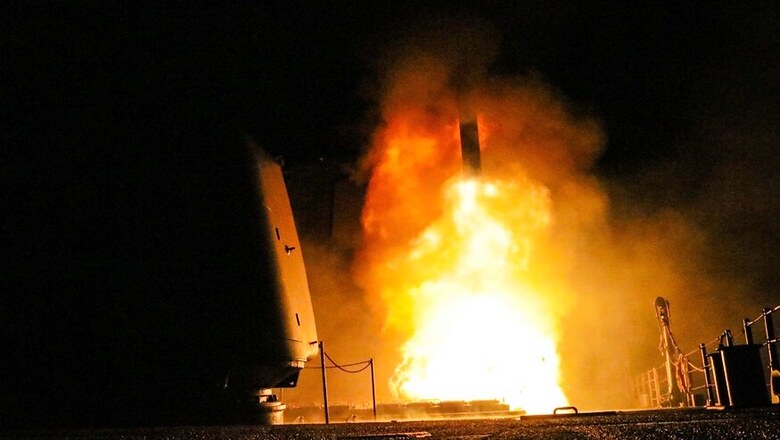
views
Lebanon: Western powers have carried out their biggest attack yet against the Syrian regime but analysts say the strikes were a mostly "punitive" measure that will not change the course of the conflict.
Exactly a week after a suspected chemical attack that medics say killed dozens of civilians in the rebel town of Douma, the United States, France and Britain acted on their retaliation threats.
Warships, fighters jets and cruise missiles were used in the coordinated operation that struck military infrastructure and sites allegedly used to develop and manufacture chemical weapons.
US President Donald Trump hailed the operation as "perfectly executed" but analysts stressed its scope was limited and Syrian President Bashar al-Assad's military strength remained virtually intact.
"This is punitive, a disciplinary measure. The message carried by the strikes is more political than military," said Sasha al-Alou, a Syria expert at the Turkey-based Omran think tank.
Paris said that Moscow, the main ally of Damascus, had been warned of the strikes.
And the Syrian Observatory for Human Rights, a Britain-based war monitor, said the targeted sites had been evacuated before the missiles struck before dawn on Saturday.
"The goal was mainly political: it was to bring back deterrence and show the Syrian regime it no longer had impunity," said Bruno Tertrais, from the Foundation for Strategic Research, a French think tank.
Avoiding an escalation
A year ago, 59 US cruise missiles had been fired at a regime base in northern Syria in response to a sarin gas attack that had killed more than 80 civilians.
"The balance of power remains unchanged," said Karim Bitar, from the Paris-based Institute of International and Strategic Affairs.
"All Russian sites were carefully avoided. The West wanted to avert an escalation and all-out conflict," he added.
The Western strikes will do little to slow the military reconquest which, with backing from Russia and Iran, has seen Assad reclaim more than half of Syrian territory.
The use of chemical weapons, such as chlorine, sparks international indignation but is far from being the most lethal weapon in the regime's arsenal.
"What is the benefit of such an action by the West if it does not yield the immediate halting of all violence and crimes against the Syrian people," said Raphael Pitti, a French doctor and activist.
According to the Syrian Observatory for Human Rights, more than 1,700 civilians were killed in a two-month, Russian-backed assault to retake Eastern Ghouta, an area that stayed a rebel-held enclave on Assad's doorstep for five years.
Only a fraction of the victims are thought to have been killed by chemical weapons. Most of them died under a rain of conventional bombs and missiles, as well as crude improvised munitions known as barrel bombs.
The main town in Eastern Ghouta, and the last to have escaped government control, is Douma, the site of the alleged chemical attack on April 7 that prompted the unprecedented Western reaction.
'Slap on the wrist'
Damascus and Moscow dismissed the Douma deaths as a Western fabrication intended to justify military action against Assad.
"For all the sound and fury of these strikes, their net effect is a slap on the wrist of Bashar al-Assad," said Nick Heras, an analyst at the Center for a New American Security.
"Horrific as Bashar al-Assad's use of chemical weapons has been, these types of weapons are not what gives Assad his decisive advantages on the battlefield," he said.
Heras explained that their usefulness for Damascus was dwarfed by that of Russia's aerial might, the manpower offered by Iran-backed militias or ruthless siege tactics.
Analysts agreed that the nature of the strikes was unlikely to cause a major escalation between the seven-year conflict's major foreign brokers.
They said Saturday's strikes may however lead to limited flare-ups on the ground, between these big players' respective proxies, including attacks against the US-backed Kurdish forces in northeastern Syria.
"The most effective way for the Assad government to respond is by targeting US partner forces, especially the Syrian Democratic Forces," Heras said.



















Comments
0 comment